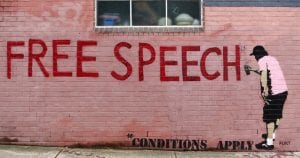By Prof Steven Greer, Professor of Human Rights (University of Bristol Law School )

Many, including the government, are convinced that ‘extremism’ is implicated in the current terrorist threat and in some of the challenges which arise in the promotion of integration and the maintenance of social cohesion in a society as diverse as the UK. It is, of course, undeniable that terrorism involves ‘violent extremism’. But it is less clear that there is a problem with ‘non-violent extremism’, or at least that it is of such significance that the state and society should be mobilizing to address it. Yet, it is also difficult to deny that the profile of ideas and behaviour hostile to humane values, tolerance and mutual respect has increased in recent years, particularly as a result of the internet and social media. It is against these backgrounds that an independent Commission for Countering Extremism was established by the government in March 2018. At the core of its mission lie three questions: what precisely is ‘extremism’? What kind of threats and risks does it pose? And what, if anything, should state and society do about it? This brief contribution considers the role that human rights might play in finding some answers.
(more…)



